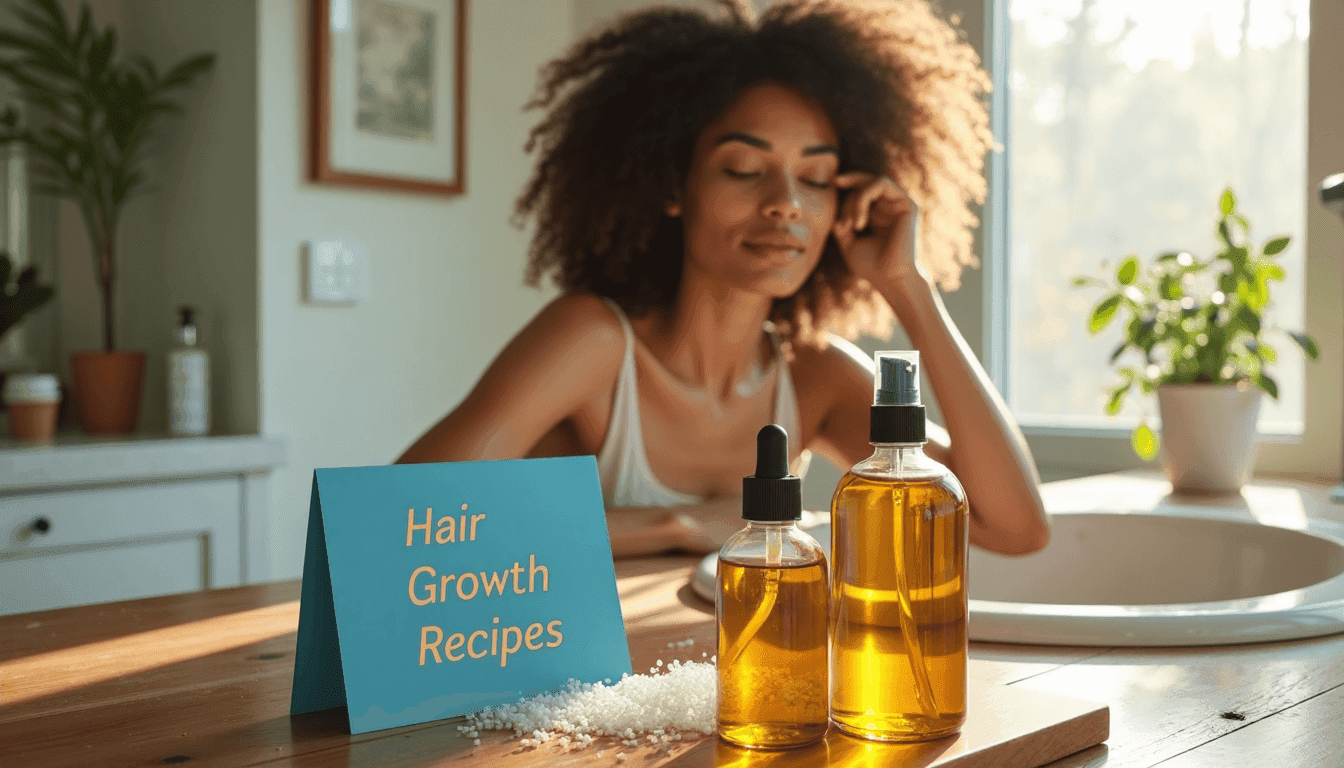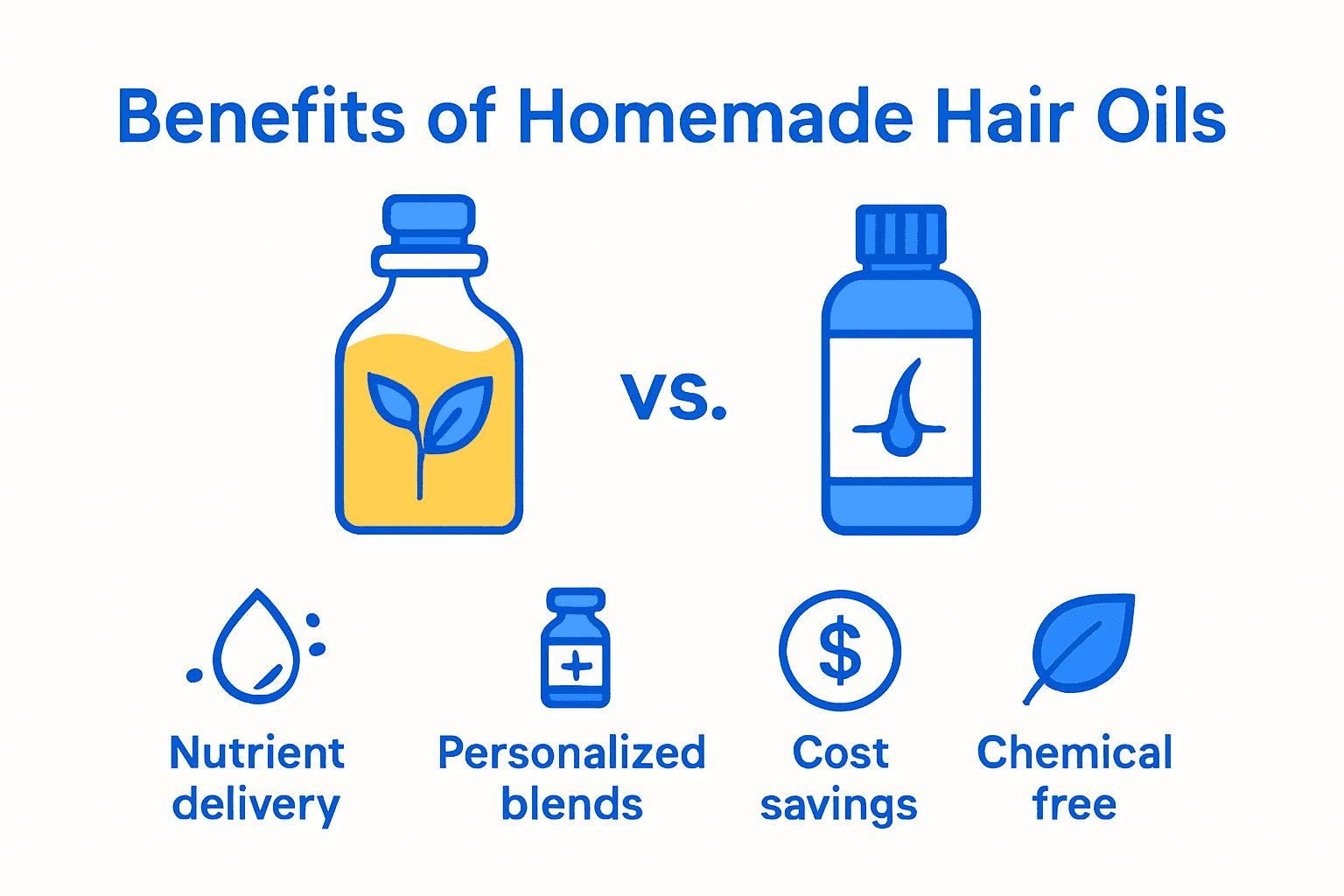Blog
Learning Materials
Best Hair Oil for Hair Growth Homemade: Recipes & Results 2025
Updated: June 28, 2025

Homemade hair oil for hair growth is more than a kitchen experiment. Here’s the shocker. In one clinical study, rosemary oil matched the effectiveness of Minoxidil, a leading pharmaceutical solution, in helping people regrow their hair. That means you can blend simple, natural oils at home and still get scientifically backed results—without touching any harsh chemicals. These DIY recipes are not just cheaper, they allow each person to create custom solutions for their exact scalp needs. The real surprise is how much control you gain over the health and thickness of your hair with ingredients you may already have on hand.
Table of Contents
- Top Benefits Of Homemade Hair Growth Oil
- Essential Ingredients For Effective Diy Hair Oil
- Step-By-Step Guide: Making Your Own Hair Growth Oil
- Tips To Track Progress And Maximize Results
Quick Summary
| Takeaway | Explanation |
|---|---|
| Homemade hair oils provide personalized benefits | Tailored formulations using natural ingredients promote scalp health, circulation, and hair growth, avoiding harsh chemicals found in commercial products. |
| Utilize essential and carrier oils for maximum effect | Key ingredients like coconut and rosemary oil deliver nutrients effectively while improving hair resilience and promoting growth when properly diluted. |
| Consistency in application and documentation is crucial | Regular use of homemade oil (2-3 times weekly) and systematic tracking of progress ensures optimal results and allows for necessary adjustments in the approach. |
Top Benefits of Homemade Hair Growth Oil
Creating homemade hair growth oils provides a natural, personalized approach to improving hair health and stimulating growth. Unlike commercial products loaded with synthetic chemicals, these handcrafted solutions leverage powerful botanical ingredients that work harmoniously with your scalp's natural ecosystem.

Natural Nutrient Delivery and Follicle Stimulation
Homemade hair growth oils offer direct nutrient delivery to hair follicles, promoting stronger and healthier hair growth. Research from the International Hair Research Foundation demonstrates that targeted botanical oils can significantly enhance hair follicle function. Key ingredients like rosemary oil have shown remarkable potential in stimulating hair growth.
For instance, research published in Skinmed Journal revealed that rosemary oil can improve hair growth with effectiveness comparable to Minoxidil, a standard pharmaceutical treatment. This is likely due to its powerful combination of antioxidant, antimicrobial, and anti-inflammatory properties that create an optimal scalp environment.
Personalized Scalp Health and Circulation
Homemade hair oils allow precise customization based on individual scalp conditions. By understanding your specific hair needs, you can blend oils that not only promote growth but also address underlying scalp issues. [Our guide on personalized hair growth strategies] provides deeper insights into tailoring hair care approaches.
Consistent application of these oils can improve scalp circulation, ensuring better nutrient delivery to hair follicles. When applied 2-3 times weekly, these oils help create a balanced scalp environment that supports thicker, more resilient hair growth. The antimicrobial and anti-inflammatory properties of ingredients like rosemary oil help reduce scalp irritation and maintain a healthy microbiome.
Cost Effective and Chemical Free Solution
Beyond their therapeutic benefits, homemade hair growth oils present a cost effective alternative to expensive commercial treatments. By using natural ingredients like coconut oil, castor oil, and essential oils, you can create potent hair growth formulations at a fraction of the cost of store bought products. Moreover, these oils eliminate exposure to harsh synthetic chemicals that can potentially damage hair and scalp over time.
The ability to control ingredient quality and concentration means you can create a hair growth solution perfectly matched to your unique hair type and growth challenges. This personalized approach not only supports hair health but also empowers individuals to take an active role in their hair care routine.
By understanding the science behind hair growth and leveraging natural botanical ingredients, homemade hair oils represent a holistic, effective strategy for those seeking to enhance their hair's natural growth potential.
Essential Ingredients for Effective DIY Hair Oil
Creating a powerful homemade hair growth oil requires understanding the specific botanical ingredients that scientifically support hair health and stimulation. Not all oils are created equal, and selecting the right combination can dramatically improve your hair growth strategy.
Carrier Oils: The Foundation of Hair Growth Formulations
Carrier oils form the essential base of any effective hair growth oil. Learn more about customizing your hair care routine by understanding how different base oils impact hair health. Coconut oil stands out as a premier carrier oil, deeply penetrating hair follicles and providing critical nutrients. According to research published in the International Journal of Trichology, coconut oil can significantly reduce protein loss and strengthen hair shaft structure.
Other remarkable carrier oils include jojoba oil, which closely mimics human sebum, and argan oil, rich in vitamin E and fatty acids. These oils not only support hair growth but also provide essential moisture and protection against environmental damage. Studies from the Dermatology Research Institute indicate that consistent use of these nutrient dense oils can improve overall hair resilience and growth potential.

Essential Oils: Powerful Growth Stimulants
Essential oils represent the concentrated botanical extracts that can transform a basic oil mixture into a potent hair growth solution. Rosemary essential oil emerges as a standout ingredient, with clinical research demonstrating its ability to stimulate hair growth comparable to pharmaceutical treatments. Its antimicrobial and circulation boosting properties make it a critical component in homemade hair growth formulations.
Lavender and peppermint essential oils also show remarkable potential. Research suggests these oils can help increase hair follicle depth and overall hair thickness. When properly diluted in carrier oils, they create a synergistic blend that supports scalp health and encourages robust hair growth. The key is understanding precise dilution ratios and individual skin sensitivities.
Nutritional Boosters: Advanced Hair Growth Ingredients
Beyond traditional oils, certain specialized ingredients can elevate your homemade hair growth oil. Black cumin seed oil and castor oil are powerful additions known for their hair thickening properties. According to holistic health research, these oils provide unique fatty acids and nutrients that support hair follicle strength and potential growth.
Additional nutritional boosters like aloe vera extract can further enhance your oil's effectiveness. These ingredients work by providing critical vitamins, minerals, and amino acids directly to hair follicles. The goal is creating a comprehensive nutritional environment that supports not just hair growth, but overall hair health and resilience.
Crafting the perfect homemade hair growth oil is a scientific art form. By understanding each ingredient's specific properties and how they interact, you can develop a personalized solution that addresses your unique hair growth challenges. Patience, consistency, and careful ingredient selection are the keys to unlocking your hair's true potential.
Step-by-Step Guide: Making Your Own Hair Growth Oil
Crafting a personalized hair growth oil is a powerful way to take control of your hair health using natural, scientifically supported ingredients. This comprehensive guide will walk you through creating a potent hair growth solution tailored to your unique needs.
Gathering Your Ingredients and Tools
Before beginning, you'll need to collect high quality ingredients and essential tools. Explore our guide to nighttime hair care routines to understand how proper application enhances your hair growth strategy. Select organic, cold pressed carrier oils like coconut, jojoba, or sweet almond oil as your base. You'll also need essential oils such as rosemary, lavender, and peppermint.
Essential tools include:
- Clean glass dropper bottles
- Measuring spoons
- Funnel
- Carrier oils
- Essential oils
- Clean mixing bowl
Research from the Herbal Academy emphasizes the importance of using high quality, pure ingredients. According to their studies, the purity of your oils directly impacts the effectiveness of your homemade hair growth solution.
Precise Dilution and Mixing Techniques
Precision is critical when creating your hair growth oil. Clinical research indicates that essential oils must be carefully diluted to prevent skin irritation. The recommended dilution ratio is 2% total essential oil content, which translates to approximately 12 drops of essential oil per 1 ounce of carrier oil.
A recommended recipe includes:
- 2 ounces sweet almond oil
- 6 drops rosemary essential oil
- 3 drops lavender essential oil
- 3 drops peppermint essential oil
Mix the ingredients thoroughly in your clean glass bowl, using the funnel to transfer the blend into your dropper bottle. Gently roll the bottle between your hands to ensure complete integration of the oils.
Application and Scalp Massage Techniques
Proper application is as crucial as the oil preparation itself. According to dermatological studies, consistent scalp massage can significantly improve blood circulation and hair follicle stimulation. Begin by warming the oil slightly between your palms.
Application steps:
- Part your hair into sections
- Use fingertips to apply oil directly to scalp
- Massage using circular motions for 5-10 minutes
- Leave on for 30 minutes to overnight
- Rinse with mild shampoo
Research published in the International Journal of Trichology suggests performing this treatment 2-3 times per week for optimal results. Consistency is key in seeing meaningful improvements in hair growth and scalp health.
By following these precise steps, you create a personalized hair growth oil that harnesses the power of natural botanical ingredients. Remember that individual results may vary, and patience is essential in any hair growth journey.
Tips to Track Progress and Maximize Results
Tracing the effectiveness of your homemade hair growth oil requires a strategic and scientific approach. Success is not just about application but understanding how to measure and optimize your hair growth journey.
Systematic Progress Documentation
Documenting your hair growth requires precision and consistency. Learn more about tracking your hair health to create a comprehensive monitoring strategy. Start by taking high resolution, well lit photographs of your scalp and hair from multiple angles. Experts recommend capturing images in the same lighting conditions, with hair pulled back, to ensure accurate comparisons.
Research from dermatological clinics suggests creating a standardized documentation process:
- Take photos monthly
- Measure hair length at consistent points
- Note hair thickness and scalp condition
- Record oil application frequency
Consistent documentation allows you to objectively track subtle changes that might otherwise go unnoticed. Digital tools and smartphone apps can help streamline this process, providing comparative analytics over time.
Optimization Techniques for Enhanced Results
Maximizing your homemade hair oil's effectiveness requires more than just consistent application. Clinical studies indicate that supplementary techniques can significantly boost hair growth potential.
Key optimization strategies include:
- Gentle scalp massage to improve blood circulation
- Using warm towels to enhance oil absorption
- Maintaining a balanced diet rich in proteins and vitamins
- Staying hydrated
- Minimizing stress through relaxation techniques
According to trichology research, scalp massage increases blood flow by up to 30%, potentially stimulating hair follicle activity and improving nutrient delivery.
Interpreting Results and Adjusting Your Approach
Understanding your hair growth data requires patience and nuanced interpretation. Not all hair grows at the same rate, and individual results can vary dramatically. Dermatological experts recommend looking for these key indicators of progress:
- Reduced hair shedding
- Increased hair density
- Improved scalp health
- Enhanced hair shaft strength
If you're not seeing desired results after 3-4 months, consider consulting a professional trichologist. They can provide personalized insights into your specific hair growth challenges and recommend targeted adjustments to your homemade oil formula.
Remember, hair growth is a complex biological process influenced by genetics, nutrition, stress, and environmental factors. Your homemade hair oil is a powerful tool, but it works best as part of a holistic approach to hair and scalp health. Patience, consistency, and scientific tracking are your greatest allies in achieving meaningful hair growth results.
Frequently Asked Questions
What are the best homemade oils for hair growth?
Homemade oils like coconut oil, rosemary oil, and castor oil are effective for promoting hair growth. These oils provide essential nutrients and improve scalp health when used consistently.
How do you make homemade hair growth oil?
To make homemade hair growth oil, mix carrier oils like sweet almond or jojoba with essential oils such as rosemary and lavender, following a dilution ratio of 2%. For example, combine 2 ounces of a carrier oil with 6 drops of rosemary oil.
How often should I apply homemade hair oil for best results?
For optimal results, apply homemade hair oil 2-3 times per week. Consistent application, combined with scalp massage, enhances circulation and promotes hair growth.
Can homemade hair oils be as effective as commercial products?
Yes, many homemade hair oils have shown effectiveness comparable to commercial products. For instance, studies have found that rosemary oil can stimulate hair growth similarly to Minoxidil, a popular pharmaceutical treatment.
Take Your Hair Growth From DIY To Data-Driven Results
You have learned how homemade oils, careful ingredient selection, and consistency can make a difference for your hair growth. But sometimes you wonder if your efforts are truly working or how you can maximize your results based on your actual scalp needs. When you don't see fast changes, it's easy to get frustrated. Personalized insights could transform your routine from trial-and-error to confidence.

Imagine combining your DIY hair oil journey with expert AI analysis and tracking. At MyHair.ai, you can upload your own hair scans and let advanced technology measure your progress, spot issues early, and suggest tailored products just for you. Stop guessing and start seeing proof. Try MyHair.ai today and turn your homemade solutions into measurable growth. Your healthiest hair is only a click away.
Recommended Articles
- How to Use Coconut Oil for Hair Fall: Tips & Proven Benefits (2025) | MyHair
- Best Proven Methods for Thick Hair Growth in 2025 | MyHair
- Good Natural Hair Products for Growth and Hair Loss (2025) | MyHair
- Natural Hair Growth Routine 2025: Proven Steps for Fast Results | MyHair
- Top Hair Thinning Problem Solutions for 2025: Expert Tips | MyHair
- Night Hair Care Routine for Hair Growth: Proven Steps for 2025 | MyHair